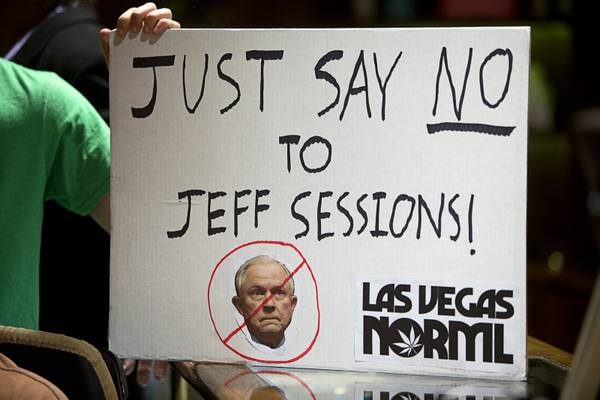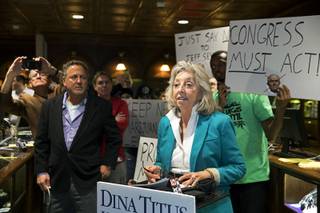A memo today that said federal authorities would be rescinding a Department of Justice document that protected states’ rights to establish legal marijuana operations was met with dismay and concern by leaders of Nevada’s pot industry, who feared the removal of the 2013 Cole Memorandum would wipe out millions of dollars in local investments and state tax revenue.
But Nevada politicians, dispensary owners and advocates of the plant also emphasized the threat of a federal crackdown on marijuana has been constant since President Donald Trump’s administration took control last year, and today’s report was nothing more than a formality.
“At this point, there has to be a solution for what you’re going to do without it,” said Nevada State Sen. Tick Segerblom, who championed legislation to legalize pot in Nevada. “There would be major repercussions if this thing stops.”
U.S. Attorney General Jeff Sessions rescinded the memorandum, which advised federal attorneys in pot-legal states to narrow their prosecution of the plant to specific offenses, among four other Obama-era policies that seemingly protected states’ rights to establish legal marijuana industries.
In a letter sent to U.S. attorneys this morning, Sessions directed them to use “previously established prosecutorial principles” regarding marijuana.
Nevada was one of four states to legalize recreational marijuana in the 2016 presidential election cycle, joining Colorado, Washington, Alaska and Oregon as the only recreational pot-legal states in the U.S.
Legal recreational sales of the plant began in July, and the Nevada Department of Taxation has brought in about $19 million in tax revenue from July 1 through Oct. 31, between a 15 percent tax on wholesale distribution from cultivation and production facilities to dispensaries, and a 10 percent excise tax on recreational pot sales. Nearly 300 licensed pot businesses across Nevada employ more than 6,500 people, according to the Nevada Dispensary Association.
The plant remains illegal under federal law.
The Cole Memorandum, published by Obama era Deputy Attorney General James Cole in August 2013, advised federal attorneys in pot-legal states to narrow their prosecution of the plant to offenses such as distribution of the plant to minors, driving under the influence or use on federal property. The Department of Justice document is often cited by state officials as formal guidance allowing states to operate pot industries. But the memorandum is not a legal order.
Nevada’s pot industry includes business professionals from the banking, medical and law fields, among others, and would affect “a large group of people,” including thousands of legal buyers across the state, Segerblom, said.
David Goldwater, a former state legislator who owns Inyo Fine Cannabis Dispensary, 2520 S. Maryland Parkway, said that while today’s move was “not favorable,” the Cole Memorandum was “nothing more than an internal policy” at the Justice Department.
Goldwater said communication with the office of the new U.S. attorney for Nevada, Dayle Elieson, whom Sessions promoted Wednesday as the state’s top prosecutor, would be the weed industry’s top priority.
“It’s more important than ever that the U.S. attorney understands our industry and we provide answers to any questions she might have,” Goldwater said. “Everything from what it means to our local economy to the state Department of Taxation.”
Riana Durrett, executive director of the Nevada Dispensary Association, echoed that message, saying Elieson’s stance on the plant will be crucial to pot’s future in Nevada.
“We can’t know anything until we know what the U.S. attorney’s take is,” she said. “There has to be information gathering before we can answer this question.”
Spokeswoman Trisha Young of the U.S. Attorney’s Office did not immediately respond to a request for comment. Stephanie Klapstein of the Nevada Department of Taxation did not comment, saying the office was still processing what the reported procedures mean to the state’s marijuana industry.
In a news release this morning, Nevada Attorney General Adam Laxalt said his office was “evaluating the ramifications” for Nevada.
“Although I opposed the Question 2 ballot initiative proposing the legalization of recreational marijuana in Nevada, I also pledged to defend the measure were it approved by the voters,” Laxalt said.
Nevada Democratic lawmakers U.S. Reps. Dina Titus, Ruben Kihuen and Jacky Rosen and U.S. Sen. Catherine Cortez Masto each released statements today in opposition of Sessions’ announcement.
Republican U.S. Sen. Dean Heller of Nevada did not take a side but issued a statement encouraging the Department of Justice to work with congressional delegations in weed-legal states. GOP Rep. Mark Amodei of Nevada did not immediately respond to a request for comment.
Nevada Gov. Brian Sandoval said in a statement his office was looking forward “further guidance” from Elieson when she takes over for acting U.S. Attorney Steven Myhre on Friday.
More than a dozen sign-holding protesters greeted Titus and Segerblom Tuesday afternoon at Apothecary Shoppe dispensary, 4240 W. Flamingo Road, as the officials touted the plant’s impact on the Nevada economy and tax coffers since the first dispensary opened for medical use in July 2015. The politicians encouraged gatherers to fight back against what they called an anti-marijuana initiative by contacting state and U.S. legislators in their respective districts.
“This is a ball that is rolling and has reached a tipping point,” Titus said. “If you asked for public opinion across the country, the majority of people are in favor of this.”
“The attorney general has put out a statement that has left us with no clue what it means,” she added.
Dr. Nick Spirtos, one of five physician owners of Apothecary Shoppe, touted the plant’s effectiveness in helping curb opiate addiction, adding that many Nevadans would revert to black-market street sellers if legalized marijuana were removed from the industry.
“This is about patient care,” Spirtos said. “In this time of opiate crisis, this is something our government, if they’re serious about opiate crisis, they should be supporting research and pushing it forward.”
Clark County Commission Chairman Steve Sisolak said Thursday afternoon the county would be “challenged” by Sessions’ directive, but added that officials would first seek legal opinion from county counsel Mary Anne Miller before moving forward with issuing additional marijuana business licenses.
Fellow county commissioner and gubernatorial candidate Chris Giunchigliani tweeted, “This is wrong,” in response to the news.
Las Vegas Councilman Bob Coffin tweeted he would testify “anytime and anywhere about the benefits I receive from this plant.” Coffin and other city officials did not immediately respond for comment regarding the future of proposed cannabis lounges outlined in a city ordinance last month and scheduled to be implemented this spring.
Nevada Department of Taxation spokeswoman Stephanie Klapstein said in a statement that Nevada’s regulating body for marijuana would continue to proceed as usual unless directed otherwise by federal authorities.


